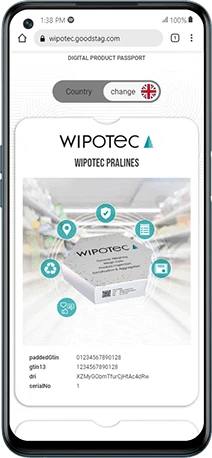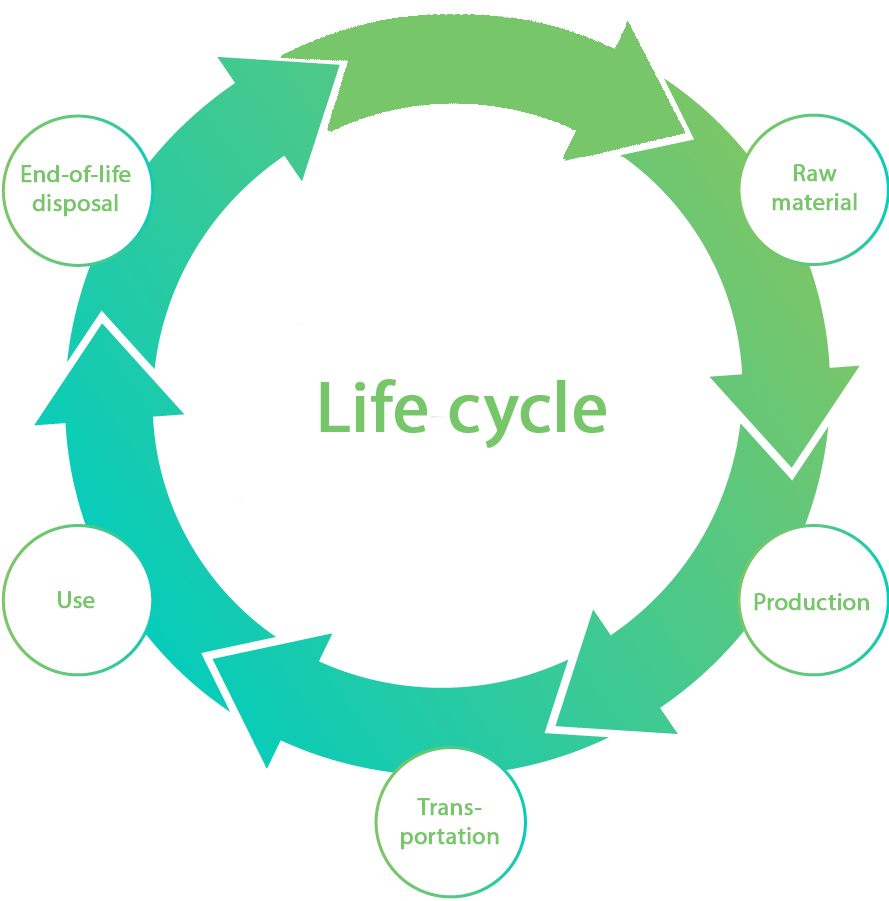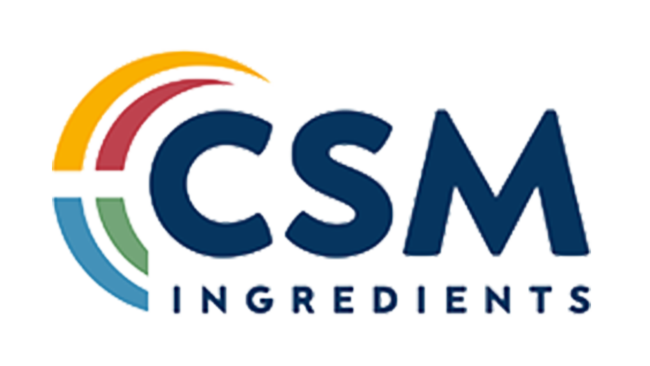in weeks, not months EU-ready Digital Product Passport (DPP)
GoodsTag’s DPP‑as‑a‑Service Platform helps brands meet local & international regulations and unlock circular economy opportunities

2027 is coming — are your DPPs ready?
By 2027, new EU regulations like ESPR and PPWR will mandate Digital Product Passports (DPPs) for a wide range of product categories. But many companies still rely on spreadsheets and static labels — a setup that risks:
- Costly fines and product recalls
- Manual data errors and version conflicts
- Over-stock from market-specific packaging requirements
(e.g. AGEC, VerpackG, Decree 116)
Launch fast, scale flexibly
GoodsTag makes DPP compliance easy
GoodsTag’s Smart Products Platform helps You roll out product-level Digital Product Passports today — and evolve to batch- or item-level granularity over time. No serialisation needed upfront. No change to the QR code.
- GS1 Digital Link ready
- Cloud-based compliance data
- Works with Your existing tools:
handhelds, RFID/NFC, ERP, PIM, CSV, APIs - Supports nested DPPs for component-level transparency
How it works
Step 1
Create product-level DPP
What happens
A single GS1 Digital Link QR goes on the item; basic compliance attributes are stored in the cloud.
Why it’s flexible
Start fast—no need for full serialisation on day one.
Step 2
Capture & sync data
What happens
Scans from printers, handhelds, RFID/NFC, plus ERP, SCM, PIM or CSV feeds enrich the passport at any lifecycle stage.
Why it’s flexible
Works with your existing hardware and IT stack—no AI engine required.
Step 3
Evolve & nest
What happens
Add batch or item serial IDs when business cases emerge, and link spare-part or component DPPs to the parent passport.
Why it’s flexible
Future-proof architecture supports deep traceability and component-level compliance.

What is a Digital Product Passport (DPP)?
The Digital Product Passport (DPP) is a standardized digital file that accompanies a product throughout its entire lifecycle. It provides structured, accessible information about each product — including material composition, carbon footprint, origin, repairability, recycling options, and safety specifications. By making this data digitally available, the DPP ensures transparency, enables regulatory compliance, and supports circular business models across the entire value chain.
Why act now?
The DPP isn’t just another box to tick — it’s a competitive edge. Early adopters can meet upcoming EU requirements (ESPR, PPWR, Battery Directive, and more) efficiently while simplifying packaging through a single QR code per product. At the same time, DPPs create new opportunities: transparent supply chains, audit-ready data, and real sustainability storytelling based on verified facts. Brands that move now turn compliance into customer trust — and future-proof their product strategy.
Let's get DDP ready with GoodsTag
Ready to get started?
Contact us today and take the first step toward EU-ready Digital Product Passports.
Let's start nowFuture-Proof Compliance
Stay ahead of ESPR, PPWR and upcoming EU rules with a solution that updates automatically—no costly reprints.
Circular Economy Readiness
Enable reuse, refurbishment and recycling with unique digital IDs for every unit—built for circular business models.
Full Product Transparency
Deliver trusted data on materials, CO₂ footprint, repairability and recycling—anytime, anywhere, in any language.
Enhanced Consumer Engagement
Turn every product into a digital touchpoint with services, guides and loyalty features that boost customer trust.
Which products are affected first?
GoodsTag: Digital Product Passports as a Service
GoodsTag delivers a fully managed DPP solution that keeps You ahead of the curve. With zero-day regulation updates, You’re always aligned with the latest ESPR, PPWR, and sector-specific requirements.
A single QR code per product is all You need — helping reduce packaging SKUs by up to 40 %.
Integration is fast and seamless with existing ERP, PLM, or PIM systems. As a GS1 strategic partner and active member of the CIRPASS-2 pilot programs (textiles, electronics, tyres), GoodsTag is shaping the future of DPP standards from the inside.
Book a demo now and see how easy scalable, regulation-ready DPPs can be.
One Platform for All Your Product Compliance Needs
GoodsTag’s Digital Product Passport platform supports your journey to compliance across a wide range of product regulations – in the EU and globally. Our modular, API-first solution adapts to your regulatory environment, product type, and local requirements.
- Digital Battery Passport (European Battery Regulation)
- PPWR (European Packaging & Packaging Waste Regulation)
- ESPR (European Ecodesign for Sustainable Products Regulation)
- AGEC (French anti-waste and reparability requirements)
- VerpackG (German Packaging Law)
- Etichettatura Ambientale (Italian Environmental Labeling Decree)
- California SB 343
- Canada Federal Plastics Registry
- ISO & OECD traceability and circular economy standards
Let's talk about Digital Product Passports
Frequently Asked Questions about the Digital Product Passport (DPP)
What is a Digital Product Passport?
A digital product passport is an electronic information system that makes all relevant data about a product available throughout its entire lifecycle. This includes details about raw material origin, material composition, production processes, transport routes, repair options, and proper disposal. Consumers and businesses can access this data via QR code or NFC chip.
Why is the DPP being introduced?
The Digital Product Passport aims to increase transparency, strengthen consumer trust, and promote sustainable resource use. It is also a key instrument for implementing the EU’s circular economy strategy. The DPP helps meet legal requirements and sets a new standard for sustainable products.
Which products are affected by the DPP?
Initially, the DPP applies to specific product categories such as batteries, electronic devices, textiles, and packaging. These categories are regulated under the EU’s “Eco Design for Sustainable Products Regulation” (ESPR). Over time, the scope will gradually expand to include more product groups.
What are the benefits for companies?
Companies benefit from improved traceability, optimized internal processes, and efficient compliance with regulatory requirements. Costs can be reduced through targeted recycling strategies and innovative service or return models. Transparent handling of product data also enhances brand trust and strengthens customer relationships.
What technical requirements must be met?
Implementing a DPP requires modern technologies such as cloud platforms, APIs, IoT solutions, and interfaces to existing ERP or PIM systems. Encrypted data structures and compliance with data protection regulations are essential. Interoperability and the use of open standards – such as GS1 Digital Link – ensure smooth system integration.
How can the DPP be technically implemented?
The DPP is typically accessed via a QR code or NFC chip attached to the product. When scanned, users are directed to a web-based view containing all relevant information. Providers like GoodsTag offer modular APIs that integrate seamlessly into ERP, CRM, or PIM systems – without media disruptions or duplicate data handling.
What costs and ROI can be expected?
Introducing a Digital Product Passport requires initial investments in technology, process adjustments, and employee training. However, these costs are offset over time through more efficient operations, lower compliance risks, and increased market value. Early adopters gain competitive advantages and unlock innovation potential.
What are the main challenges in implementation?
Ensuring high-quality, consistent data across the supply chain is a major challenge for many companies. Clear processes, responsibilities, and interfaces are needed to deliver accurate and up-to-date information. Engaging employees, partners, and end customers also requires communication and training. From a technical perspective, offline solutions like locally readable NFC tags are still under development.
How does GoodsTag support companies?
GoodsTag offers a flexible, scalable platform for centralized product data management. This includes lifecycle tools, regulatory compliance features, and direct partner integration. Companies benefit from fast, API-driven implementation, expert consulting, and change management support. With GoodsTag, the DPP becomes more than a requirement – it becomes a digital innovation opportunity.
When is the right time to act?
The first EU requirements will take effect in 2026. Companies that prepare now have time for pilot projects, internal alignment, and technical implementation. Early movers not only ensure compliance but also gain a competitive edge and the ability to build new business models around transparency and sustainability.





